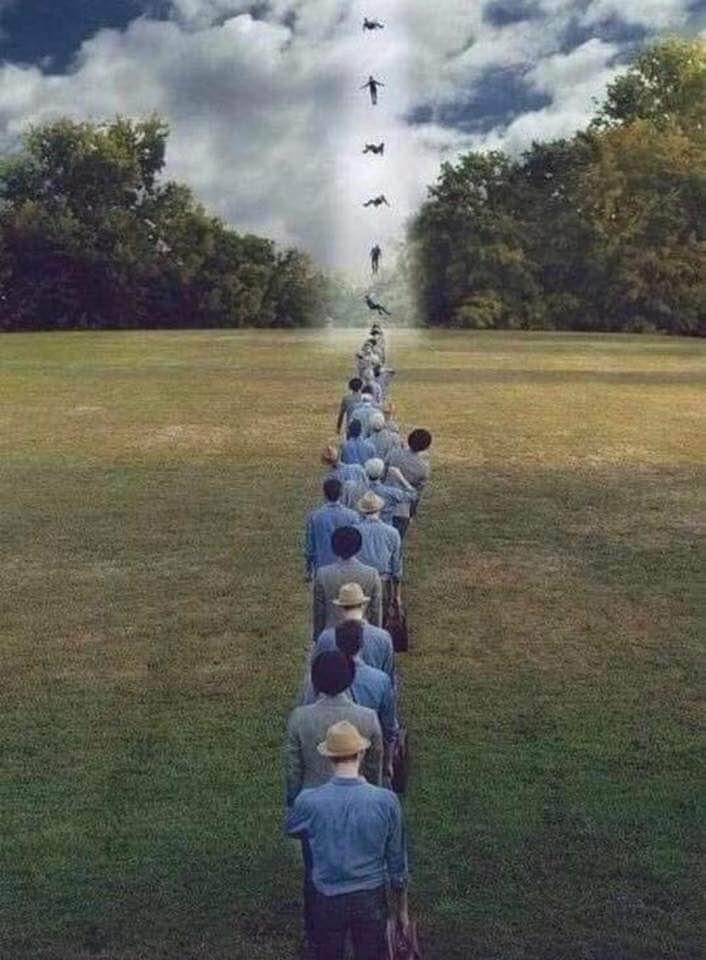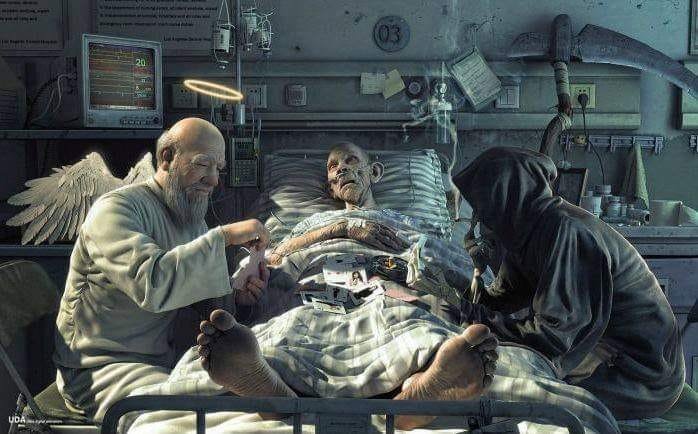Where Are All The Dead And What Happens When We Die
We live in a time when there is great fascination about life after death. Why this fascination with the world beyond the grave? Is it not because death is so final? Whatever one thinks about the reports of “near-death” visions, death when it finally comes is irreversible.
When you finally cross the line, there is no coming back from the other side. Death wins the battle every time. After the doctors have tried the latest wonder drug, after the best minds have pooled their wisdom, after the philosophers have done their best to explain that death is only a natural part of life, we come face to face with the ugly reality that someday we will all die.
And that death—whether planned or accidental, whether comfortable or painful—will be the end of life as we have known it.
Questions about Life after Death
In answering questions about life after death, we are left with only two sources to consult. Either we turn to human experience or we turn to the Word of God. If we turn to human experience, we find many guesses, many ideas, many theories—but no sure answers.
That’s because, in the nature of the case, no human has a sure answer. The only people who have the answer are dead! That leaves us with the Word of God. In God’s Word we find ample, abundant answers. God who knows the future knows what happens when we die, and he hasn’t left us to wonder about it.
The Bible is filled with information on this subject, so much in fact that we can offer only a brief survey in this chapter. If you want the answer in one sentence here it is: What happens after you die depends on what happens before you die. Consider what the Bible says in Hebrews 9:27, “It is appointed for men to die once, but after this the judgment” (NKJV).

This is an appointment no one will miss. As someone has noted, the statistics on death are appalling. One hundred out of one hundred people will eventually die. We are all terminally ill with a disease called death; we just don’t know when the end will come.
Before we go further, let’s stop and think about some important questions that people often ask about death and dying.
Is There a “Second Chance” after Death?
This is the popular view of many people who hope that those who did not accept Christ in this life will somehow have a second chance after death—either in the afterlife or perhaps through reincarnation. The answer is quite simple: There is no biblical support whatsoever for the notion of a “second chance.”
Hebrews 9:27 declares that we die once and after that comes the judgment of God. Let no one be mistaken on this point. The only opportunity you will ever have to get right with God is the opportunity God affords you right now. If you dream of coming to God after you die, you are nursing a vain hope.
What about “Near-Death Experiences”?
Such experiences are very popular today. I’ve already mentioned the pioneering work of Raymond Moody. Other books in recent years have purported to tell of people who “died,” went to “heaven,” and then were given a “second chance” to return to the earth.
Some of those books have been extremely popular, and a few have been embraced by Christians. However, a close inspection shows that most of those books embrace unbiblical heresy, either the notion that we are saved by doing good works or the idea that everyone is going to heaven in the end.
In thinking about this question, we need biblical balance. On one hand it’s undeniably true that some Bible characters did see the Lord before they died. Stephen saw Jesus just before he died in Acts 7. Paul was evidently given a vision of heaven—perhaps during his stoning at Lystra in Acts 14.
He alludes to the event in 2 Corinthians 12. However, it’s important to say that such revelations did not happen often even in Bible times. Not every believer had or will have a revelation of heaven. Could such a thing happen today? Yes, but we shouldn’t expect it or base our hope of heaven upon a last-second experience.

Let’s also remember that Satan is the great deceiver. He can create scenes that seem to be scenes of heaven but are actually creations born in hell. Some near-death experiences are demonic in nature. You should never base your hope of heaven—or the hope of seeing a loved one in heaven—on a supposed vision or revelation.
The only reliable ground given to us is the eternal, unchanging Word of God.
What Happens to Children Who Die?
This is obviously a very tender subject to many people. Parents want to know: Will I see my child again? The place to begin in answering this question is with the observation that the Bible doesn’t specifically address this question. However, we do know two things are true.
First, children are not born innocent, but sinful. If children who die do go to heaven—and I believe they do—it is not because they are morally innocent in the sight of God. All of us are born with an inclination to sin that leads us away from God. Ephesians 2:1 says that we are spiritually dead by nature.
That applies as much to young children as it does to adults. Second, we know that God’s grace is always greater than human sin. Romans 5:20 reminds us that where sin abounded, grace superabounded. God’s grace always goes far beyond sin’s disgrace.
I believe that God’s grace credits children with the merits of Jesus’ blood and righteousness so that children who die before they are old enough to believe are covered by His blood, and their entrance into heaven is made sure and certain. Thus they are saved by grace exactly as we are.

Can We Contact the Dead after They Are Gone?
The answer is no. Any attempt to dabble in spirit contact is strictly forbidden in the Bible. It is sometimes called necromancy or sorcery or dealing with familiar spirits. Remember, demons can masquerade as the dead. They can even mimic the voices of our loved ones and give information that only the dead person would have known (for more on this subject, see Leviticus 19:26-28, Leviticus 19:31; Deuteronomy 18:9-14; Galatians 5:20).
In case this isn’t clear, let me make it plain. Do not attempt to contact the dead through any means at all—séances, parlor games, crystal balls, psychic readers, channelers, or mediums. You are involving yourself in that which God forbids. Leave the dead alone.
What Do You Say to Someone Who Has Lost a Loved One?
Over the years I have discovered that it really doesn’t matter what you say in terms of the precise words. Those who are grieving will not remember the words you say, but they will never forget that you cared enough to be there when they needed you.
If you go with God’s love in your heart, he will give you any words you need to say. That means we don’t need to answer questions only God can answer. If we don’t know the spiritual state of the deceased, we shouldn’t speculate, either to offer false hope or lay a heavier burden on those who are left behind.
God is both just and merciful, and in every case He will do what is right.
What Happens at the Moment of Death
Now we come to the central question: What happens at the very moment of death? I have already given the general answer: What happens when you die depends on what happens before you die. The Bible classifies the whole human race into two broad categories—the saved and the lost.
The saved are those who have trusted Jesus Christ as Lord and Savior. The lost are those who haven’t. What happens to the saved is radically different from what happens to the lost.
. . . For the Saved
The Bible is abundantly clear on this point. When the saved die, they go directly into the presence of the Lord. At this point we remember the words of Jesus to the thief on the cross, “I tell you the truth, today you will be with me in paradise” (Luke 23:43, emphasis added).
This appears to be a straightforward promise that at the moment of death the repentant thief would pass from his life of crime and his agonizing death into the realm called “paradise.” This would seem to contradict the teaching called “soul-sleep,” which implies that at death a believer “sleeps” in a kind of suspended animation until the day of the resurrection.
How could the thief be that very day in paradise if his soul went to sleep when he died? At the moment of death the believer passes immediately into the personal presence of Jesus Christ. This is our hope and comfort as we stand at the graveside of a loved one.

Paul said he had a desire “to depart and be with Christ, which is better by far” (Philippians 1:23, emphasis added). He also said, “We are confident, I say, and would prefer to be away from the body (that is, separated from the body by death) and at home with the Lord’ (2 Corinthians 5:8, emphasis added).
These are the words of a man who believed that heaven would begin at the moment of his death. Was Paul looking forward to an unconscious slumber after his death? No! He was looking forward to the personal presence of Jesus Christ.
But that’s not the whole story. The soul goes to be with the Lord in heaven, and the body is buried until the day of resurrection when Jesus returns to the earth. 1 Thessalonians 4:14 says, “We believe that Jesus died and rose again and so we believe that God will bring with Jesus those who have fallen asleep in him.”
Here you have both sides of the truth. Christians who die are said to be “with Jesus” (that’s the soul in the conscious presence of the Lord) and “have fallen asleep in him” (that’s the body which “sleeps” in the grave). Listen to Paul’s description of that great reunion of body and soul: “For the Lord himself will come down from heaven, with a loud command, with the voice of the archangel and with the trumpet call of God.
And the dead in Christ will rise first” (1 Thessalonians 4:16, emphasis added). Here is a clear promise of future bodily resurrection for the believer.

1 Corinthians 15:51-55 adds the crucial fact that our bodies will be “raised imperishable”—that is, with a body that is perfect in every way. Free from the vestiges of death and decay… In this life our bodies wear out, like a clock continually running down.
But when we are raised, it will be with bodies that can never decay, never wear out, never suffer injury, never grow old, never get sick, and thank God, never die. Many Christians have a wrong view of death. We think we’re going from the land of living to the land of dying.
But the opposite is true. If you know Jesus, you are going from the land of dying to the land of the living. Here are some of the images the Bible uses for the death of a Christian: going to sleep and waking up in heaven . . . moving from a tent to a mansion . . . walking from the darkness into a well-lit room . . . coming home to see your family and friends . . . being set free from prison . . . taking a long journey to a new land . . . riding a chariot to the New Jerusalem . . . moving into a brand-new home . . . opening a gate to a brand-new world.
Christians have always faced death with confidence. The very word cemetery comes from a Greek word meaning “sleeping-place,” which refers to their confidence in the promise of the resurrection. Many pagans cremated their dead because they saw no further use for the human body.
But Christians buried their dead as a statement of faith in the coming resurrection of the body. I have been asked more than once how God can raise the dead if the body has been burned or lost or vaporized in some terrible explosion. I don’t think that’s a difficult question at all.
If you can raise the dead, you can raise the dead. Resurrection is God’s problem, not ours. We don’t need to know the how of the resurrection as long as we know the who. As he lay dying, D. L. Moody proclaimed, “Earth recedes, heaven opens before me.”
Catherine Booth, wife of the founder of the Salvation Army, cried out, “The waters are rising, but I am not sinking.” And George MacDonald, the English novelist, said, “I came from God, and I’m going back to God, and I won’t have any gaps of death in the middle of my life.”
John Wesley summed up the faith of the early Methodists with four simple words: “Our people die well.”
When Benjamin Franklin was twenty-three years old, he wrote the following epitaph. His words catch the essence of the Christian doctrine of bodily resurrection:
The body of Benjamin Franklin
Printer;
Like the cover of an old book,
Its contents torn out,
And stripped of its lettering and gilding,
Lies here, food for worms.
But the work shall not be wholly lost:
For it will, as he believed, appear once more,
In a new and more elegant edition,
Revised and corrected
By the Author.
Once our bodies are raised, we will be with the Lord forever. Wherever he is, there we will be, rejoicing, praising, singing, and celebrating throughout the ages of eternity. 1 Thessalonians 4:17 says, “We will be with the Lord forever.” Speaking of his own return, Jesus said, “In my Father’s house are many rooms; if it were not so, I would have told you.
I am going there to prepare a place for you. And if I go and prepare a place for you, I will come back and take you to be with me that you also may be where I am” (John 14:2-3, emphasis added).
What is ahead for us when we die?
- Our soul goes into the conscious presence of the Lord.
- Our body is buried until the day of resurrection.
- When Christ returns, we will be raised bodily from the grave.
- Body and soul reunited, we will be with the Lord forever.
As Tony Evans says, “Have a good time at my funeral, because I’m not going to be there.”

… For the Lost
Now we turn to briefly consider the fate of those who die without Jesus Christ. The lost fear death and with good reason.
Job 18:14 calls death “the king of terrors.” Hebrews 2:14 reminds us that the devil holds people in bondage through the fear of death.
And 1 Corinthians 15:26 calls death “the last enemy.”
Before saying any more, we should note one similarity between the fate of the saved and the lost.
At the moment of death, the body is buried in the grave while the soul enters a new realm. For the believer, the moment of death brings him into the personal presence of Christ. For the unbeliever, death begins an experience of unending conscious punishment.
We can summarize the fate of the lost in four short statements:
1. At the moment of death the soul of the lost is sent to hell where it is in conscious torment. In Luke 16:19-31 Jesus told of a rich man who upon his death went to hell and suffered in the flames of torment. It does not matter whether you think this passage is literal or figurative. If you say it is literal, then it must be a terrible punishment. If it is figurative, the figure itself is so awful to consider that the reality must be much worse.
2. That punishment is eternal. Though this is debated in some circles today, Christians have united across the centuries in their belief that the Bible teaches an eternal punishment for those who do not know our Lord. Mark 9:43-48 speaks of the fire that is not quenched and the worm that does not die—a reference to the continuing existence of human personality in hell.
3. The body is raised at the Great White Throne judgment. Revelation 20:11-15 describes the awesome scene as the unsaved dead are raised to stand before God and receive their final sentence of doom.
4. The unsaved are then cast into the lake of fire where they will reside forever, eternally separated from the presence of Almighty God. If this is unbearable to think about, if we shrink from such a thought, then let us by all means do whatever is necessary to make sure that such a fate does not befall us or the ones we love the most.

This is the final destiny of those who do not know Jesus Christ. To make it more personal, it is the final destiny of your friends and neighbors, your loved ones, your parents, your brothers, your sisters, your children, if they die without Jesus Christ.
And it is your destiny if you die without Jesus Christ. Let that thought linger in your mind. The reality of hell is more than just a theoretical doctrine. There is a place reserved for you in the lake of fire unless you by a conscious choice put your complete trust in Jesus Christ as your Lord and Savior.
Dr. Barnhouse and the Shadow of Death
Only one question remains. How can you personally face your own death with confidence? Dr. Donald Grey Barnhouse—beloved Bible teacher of another generation—told the following story. While he was still a young man in the ministry, his first wife died.
As he was returning from the funeral with his heartbroken children, their car came to a stoplight just as a massive truck pulled up next to them, blocking the light of the sun. Seeing the immense shadow that had overtaken them, Dr. Barnhouse asked his children if they would rather be run over by the truck or by the shadow of the truck.
“By the shadow,” the children instantly replied, knowing that a shadow could not hurt them. “That’s what has happened to your mother,” he told them. “Death cannot hurt her because the Lord Jesus Christ took her to heaven. It is only the shadow of death that took her from us.”
If you know Jesus, you have nothing to fear when death knocks at your door. Death comes to all of us—it will come for you one of these days. Do you know Jesus? If so, then you need not live in fear. Death may be quick or slow, painful or painless, but when the moment comes, you will find yourself ushered into heaven where you will see Jesus face to face.
Some people wonder if they will have enough faith when they die. They worry about losing their faith and wonder if that will cause God to turn them away. When she was a young child in Holland Corrie ten Boom worried about her own death and whether or not she would have enough courage when the moment finally came.
Her father—Papa ten Boom—knew of her fears and calmed her heart with these words: “Corrie, when I am going to take you on the train, when do I give you the ticket?” “Just before we get on board.” “That’s right. Dying is like taking a trip to see the Lord Jesus.
He will give you whatever you need just when you need it. If you don’t have the courage now, it’s because you don’t need it now. When you need it, the Lord will give it to you, and you won’t be afraid.”
In another generation, believers talked about “dying grace.” They meant the special enablement God gives to his children as death draws near. Countless Christians who worried about their last moments on earth have exited this life full of faith because the Lord gave them grace just when they needed it most.
Jesus Has the Keys
Here are the words of Jesus in Revelation 1:18: “I am the Living One; I was dead, and behold I am alive for ever and ever! And I hold the keys of death and Hades.” Keys are a sign of authority. If you have the keys to my house, you can open it and go in anytime you want.
It is often said that the devil owns the gates of hell—that is, he has the power of death. But that’s okay. The devil has the gates, but Jesus has the keys. We have nothing to fear in the moment of death for when the time comes, Jesus will personally unlock the gate and usher us into his presence.
“I am the resurrection and the life. He who believes in me will live, even though he dies; and whoever lives and believes in me will never die. Do you believe this?” (John 11:25). If you believe in Jesus, you will never die. What an amazing promise.
But believers die every day. Yes, but for the believer, death is merely the passing from this life with all its sorrows into life eternal in the presence of our Lord. The question is not: What happens when we die? But rather: What will happen when you die?
Death is not the end of the road, it is only a bend in the road. For the believer, death is the doorway to heaven. For the unbeliever, it is a passageway into unimaginable suffering. These things are true even if we do not fully understand them. They are true even if we don’t believe them.
What happens when you die depends on what happens before you die. Here is my final word to you: Make sure you’re ready to die so that when the time comes, you won’t be surprised by what happens next.
A Truth to Remember:
What happens when you die depends on what happens before you die.
Take a moment to calculate the number of days you have lived so far. Now take a guess as to how many more days you expect to live. What is the most eternally profitable way you can spend your remaining days?















